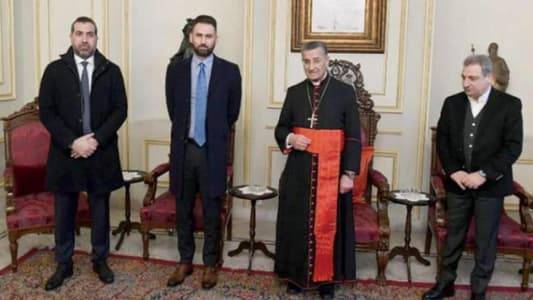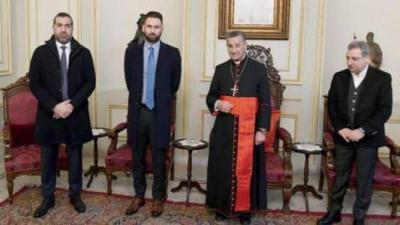The "Progressive Socialist Party" has propelled Army Commander General Joseph Aoun by declaring that he "tops the list of candidates for the presidency." This marks a first-of-its-kind position, while affirming that there is no candidate currently backed by 65 deputies. This stance arose from consultations and meetings the party and its parliamentary bloc have been conducting, the latest of which occurred yesterday with a number of its deputies meeting with Maronite Patriarch Bechara Al-Rahi, as well as a meeting between the head of the "Socialist" party, former MP Walid Jumblatt, and Parliament Speaker Nabih Berri.
After several meetings held by representatives from the "Socialist" party with political parties, including allies and adversaries, such as "Hezbollah" and "the Free Patriotic Movement," along with constant communication with others like Parliament Speaker Nabih Berri and "Lebanese Forces," the head of the "Democratic Gathering" bloc, MP Taymour Jumblatt, visited the Maronite Patriarchate in Bkerke yesterday morning, leading a delegation that included MPs Wael Abu Faour and Raji Saad. They discussed the presidential election and political developments.
Following the meeting, Saad stated: "Our visit today to the patriarchal edifice is to confirm that Bkerke is keen on the nation, and represents the primary supporter of the Taif Agreement and the Constitution; there is no solution outside adherence to the Constitution and the Taif Agreement, restoring life to institutions, and launching the economic and financial rescue process by immediately starting reforms." He emphasized an agreement with the Patriarch "on the necessity of electing a president; because restoring order to constitutional life and partnership begins with the election of a new president, especially amid the disintegration of institutions and the unfortunate and serious judicial conflict. We hope it does not take on a sectarian dimension, given the assault on all financial institutions, the collapse of all sectors, and the fear of an attack on security institutions." He also confirmed "the importance of coexistence and the implementation of administrative decentralization according to the Constitution, which will lead us to safety."
Additionally, he stated: "Based on everything we have said, we agree with the Patriarch that there is no solution outside adhering to the Constitution and the Taif Agreement, electing a president, restoring life to institutions, preventing the expansion of vacancy, and launching the financial and economic rescue process through the immediate start of reforms."
In response to a question, Saad replied: "There is no agreement on a specific name for the presidency; however, there is a hierarchy of names, and Army Commander General Joseph Aoun is at the forefront of all the available names. This does not mean it is the position of the 'Democratic Gathering,' but rather the result of discussions between all blocs." When asked if the names proposed by Walid Jumblatt for the presidency were discussed with Patriarch Al-Rahi, Saad said: "Today, there is no agreement on a specific name, but there is a kind of hierarchy among the proposed names. We are not talking about the position of the 'Democratic Gathering,' but rather the outcomes of all meetings held among all parties and blocs, even in terms of foreign states, that General Aoun's name is being widely circulated."
Regarding the need to amend the Constitution if an agreement is reached on the Army Commander, and whether there will be enough deputies to make this amendment possible, he stated: "There are names under discussion, and if a broad agreement is ultimately reached on General Aoun, we will talk about amending the Constitution afterward. But so far, we have not reached an agreement on a name for constitutional amendment; once a name is agreed upon, we will discuss that."
MP Hadi Abu Al-Hassan from the "Socialist" party clarified to "Asharq Al-Awsat" that the assertion of General Aoun leading the list comes from external support from some friendly countries and internal support from some parties. In response to a question about which parliamentary blocs support General Aoun, Abu Al-Hassan explained: "The Lebanese Forces have not hidden their support for him if there is a consensus on it, along with several opposition forces. We all agree that when we decide to transition from supporting MP Michel Moawad, that will directly lead to electing a president."
Abu Al-Hassan also discussed the movement and meetings being conducted by the "Democratic Gathering," indicating that the push began from the last election session when the alarm was sounded, hinting at a boycott of sessions. On that same day, they met with "Hezbollah," and then MP Gibran Bassil, and yesterday they met with the Patriarch, with plans to soon meet with the Parliament Speaker. He reminded that during the meetings, three names are being discussed: General Joseph Aoun, former Minister Jihad Azour, and former MP Salah Hnein. Abu Al-Hassan believed that Hezbollah's insistence on their candidate, the head of "Marlada Movement" Sleiman Frangieh, stems from considerations associated with him, including Bassil's rejection of him, adding that approval of the Army Commander would require specific guarantees.
When asked if the presidential election crisis is approaching a resolution, Abu Al-Hassan replied: "I don't believe so; we are making some progress, but we have not yet approached it; the calculations remain complicated, and the resistance is troubled between Bassil and Frangieh, and our team is in turmoil due to some individuals' abstention from supporting Moawad."
Meanwhile, sources from the "Forces" party have declined to comment on the names, affirming their support for Michel Moawad's nomination as of now. They told "Asharq Al-Awsat": "Any name that can reconcile reform and sovereignty, and is not subject to the resistance team, we surely welcome; because we want to end the presidential vacancy." The sources praised the current presidential movement, stating: "This presidential activity that emerges with names is necessary and should lead somewhere, although it should have occurred in council halls according to successive election sessions, which has not happened due to deliberate and systematic obstruction by the other team."
While they see that this movement adds extra pressure, they confirm "the problem lies with the other team that still clings to its position and candidacy and does not want to move to a consensual space." Additionally, the presidential elections were the focus of MP Faisal Karami's visit to Bkerke. Following his meeting with the Patriarch, Karami stated: "We are making initiatives to reconnect what has been severed between all parties and to listen to their concerns for consensus; because without consensus, there will be no president for the Republic."
He added: "From here, we confirm that the presidency is the beginning of the solution to all the crises engulfing the country; because without a president, the work of constitutional institutions will not be organized, and thus the Taif Agreement is the essential entrance to resolving all crises..."
In response to a question about whether he supports amending the Constitution if there is consensus on the Army Commander's name, he replied: "By nature, I am against tampering with the Constitution, but if this matter is an outlet to resolve issues, especially since there are precedents for this subject, there is no problem, because we have reached a point where the people are exhausted and the country is in a deteriorating situation, in addition to the cutoff of relations between parties and with the outside. This does not mean that I am declaring who the candidate is; I support consensus and the election of a president who unites rather than divides."




